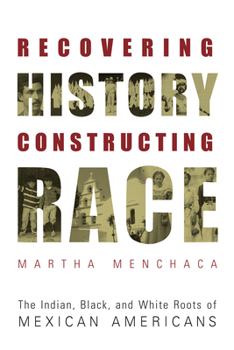Recovering History, Constructing Race: The Indian, Black, and White Roots of Mexican Americans
(Part of the Latin American and Latino Art and Culture Series)
Select Format
Select Condition 
Book Overview
The history of Mexican Americans is a history of the intermingling of races--Indian, White, and Black. This racial history underlies a legacy of racial discrimination against Mexican Americans and their Mexican ancestors that stretches from the Spanish conquest to current battles over ending affirmative action and other assistance programs for ethnic minorities. Asserting the centrality of race in Mexican American history, Martha Menchaca here offers the first interpretive racial history of Mexican Americans, focusing on racial foundations and race relations from prehispanic times to the present. Menchaca uses the concept of racialization to describe the process through which Spanish, Mexican, and U.S. authorities constructed racial status hierarchies that marginalized Mexicans of color and restricted their rights of land ownership. She traces this process from the Spanish colonial period and the introduction of slavery through racial laws affecting Mexican Americans into the late twentieth-century. This re-viewing of familiar history through the lens of race recovers Blacks as important historical actors, links Indians and the mission system in the Southwest to the Mexican American present, and reveals the legal and illegal means by which Mexican Americans lost their land grants.
Format:Paperback
Language:English
ISBN:0292752547
ISBN13:9780292752542
Release Date:January 2002
Publisher:University of Texas Press
Length:392 Pages
Weight:1.18 lbs.
Dimensions:0.8" x 6.3" x 9.0"
Customer Reviews
2 ratings
An excellent starting point
Published by Thriftbooks.com User , 18 years ago
Professor Menchaca's text provides an excellent survey and introduction into the development of ethnic identity in Mexico. 'Scholars' like M.J. Araujo would be well served to read this text with an open mind as the content, backed up by true research, counters a great deal of what has been commonly thought about Mexican ethnic -- and so-called racial -- identity.
A Significant Contribution
Published by Thriftbooks.com User , 21 years ago
Contrary to the review by Mr. Araujo, which makes little sense, Professor Menchaca has produced a stunning contribution to current understandings of the Mexican and Mexican American or Chicano experience. Having previously reviewed this book in other contexts, I know all too well the details that make this book significant. In addition to the substantive body of information presented on the cultural contexts and legislative practices that undergird the Mexican American cultural experience, Menchaca's acknowledgement of the African American contribution in said experience, and the legislative and juridical practices that served to disenfranchise people of color in the US Southwest, are all key to what she has to say. Her discussion of the Hispanic colonial Missions and their role in the creation of the Hispanicized Indian communities of the US Southwest is in turn illuminating. Contrary to prevailing anti-Hispanic and or anti-Catholic views of the Mission era, Menchaca makes clear that the hispanicization of the California Indian, for instance, permitted most California Indians of the early American era to assimilate into Mexican and Mexican American communities. This process, she argues, allowed California Indian descendants to survive and prosper under what was otherwise a brutal and genocidal system of early American behavior toward American Indian communities. These critically significant points of departure, and Menchaca's very readable prose, make this a must-have addition to any library on the Mexican American cultural experience.





